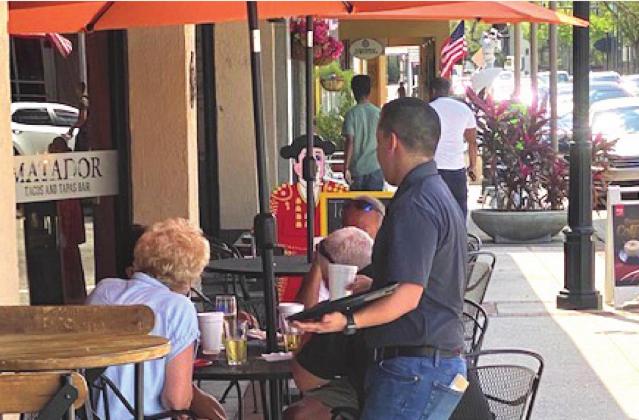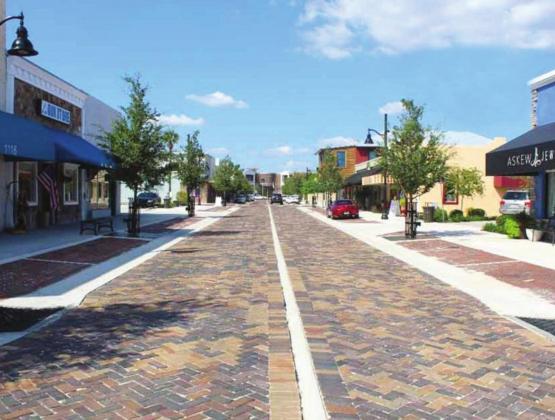State and federal programs now available
It’s not business as usual in Osceola County.
Local businesses already are taking a hit after closing or scaling back operations because of the Covid-19 virus.
The downtown districts in Kissimmee, St. Cloud and Celebration are not completely lifeless, but you can see and feel the difference. There are fewer people on the street and fewer places to go.
Gov. Ron DeSantis on Tuesday ordered the closure of all bars and nightclubs in Florida and that restaurants operate at half capacity.
Reported losses by members of the Kissimmee/ Osceola County Chamber of Commerce alone were $5.8 million by Thursday.
The chamber is reaching out to each of its 700 member companies to find out exactly what they need and continues to post updates about state and federal emergency funds for businesses on its website, said Chamber President John Newstreet.
“We’re focused on our members, but we’ll share as much information as we can with the community. We want everybody to work through this and to survive this,” he said.
So far, the chamber’s list includes information and forms to apply for the federal Small Business Administration Disaster Loan Assistance program, the Florida Small Business Emergency Bridge Loan program and reemployment assistance from the Florida Department of Economic Opportunity.
The chamber is also encouraging businesses to take the state’s Business Damage Assessment Survey, which helps determine state and federal relief funding.
“As we mitigate against the spread of COVID-19, the health, safety and wellbeing of Floridians comes first,” DeSantis said.
“I understand the harm mitigation strategies will have on small businesses throughout our state. By activating the Florida Small Business Emergency Bridge Loan, we are providing the opportunity for Florida’s small businesses to receive cash immediately,” he said.
Small business owners with two to 100 employees can apply for shortterm loans up to $50,000 through the state program. The loans are interest-free for up to one year and are designed to bridge the gap to either federal SBA loans or commercially available loans.
Tourism is the backbone of the local economy and is the state’s top industry. It relies on people traveling here for vacations and conventions, many of which have been canceled or postponed.
The Orange County Convention Center, the second-largest in the nation, already has lost $363 million from the cancellation of 10 conventions over the past few weeks.
And with Disney World and Universal Studios shut down and people everywhere hunkering down at home because of the virus, tourism is grinding to a halt fast.
Restaurants and hotels are among the most critical cases in the chamber’s triage, Newstreet said.
“Disney changed the game tremendously,” he said.
But it’s not just the tourism, restaurant and entertainment industries that have been affected.
Other service-related businesses such as salons, banks and medical offices also have closed for the month or have reduced hours to prevent the spread of the virus.
According to the Brookings Institute, more than 27 percent of Central Florida jobs are in highrisk industries because of coronavirus.
On a national level, lawmakers and the White House are working on massive stimulus packages to help save the economy. The Trump Administration’s $1 trillion proposed rescue plan includes sending thousanddollar checks to many Americans and devoting $300 billion toward helping small businesses avoid mass layoffs. It also includes $50 billion to help rescue the airline industry and $150 billion to prop up other sectors, including hotels.
Meanwhile, in Osceola, the business community is preparing for the worst and hoping for the best.
“Things are going to get worse before they get better. But once we come through this, it will be like the spring following winter,” Newstreet said.
“This was an unexpected contraction and we will be bigger, better and stronger after we clear this hurdle.”
Bridge Loan Program for Small Businesses
DeSantis activated the Florida Small Business Emergency Bridge Loan Program to support small businesses impacted by COVID-19. The bridge loan program, managed by the Florida Department of Economic Opportunity (DEO), will provide shortterm, interest-free loans to small businesses that experienced economic injury from COVID-19. The application period runs through May 8.
DEO will administer the Florida Small Business Emergency Bridge Loan Program in partnership with the Florida SBDC Network and Florida First Capital Finance Corporation to provide cash flow to businesses economically impacted by COVID-19. The shortterm, interest-free loans help bridge the gap between the time the economic impact occurred and when a business secures other financial resources, including payment of insurance claims or longerterm Small Business Administration (SBA) loans. Up to $50 million has been allocated for the program.
“Governor DeSantis has been a true leader in the fight to prevent the spread of COVID-19 and has prioritized the safety of all Floridians,” said Florida Department of Economic Opportunity Executive Director, Ken Lawson. “The Florida Small Business Emergency Bridge Loan will help Florida’s small businesses get through this unsettling time. We appreciate the Governor’s efforts to keep Florida’s small businesses top of mind and our partners at the Florida SBDC Network and Florida First Capital Finance Corporation to help them recover.”
Small business owners with two to 100 employees located in Florida affected by COVID-19 can apply for short-term loans up to $50,000. These loans are interest-free for up to one year and are designed to bridge the gap to either federal SBA loans or commercially available loans. DEO will work with every borrower to ensure that repayment of the loan isn’t an overwhelming burden. To be eligible, a business must have been established prior to March 9, 2020 and demonstrate economic impacts as a result of COVID-19.
“Mitigating the spread of COVID-19 in Florida must be our number one priority,” said Florida SBDC Network CEO, Mike Myhre. “The Florida SBDC Network stands ready to assist Governor DeSantis and the Florida Department of Economic Opportunity to help small businesses recover as a result of the impacts of COVID-19.”
“We are ready to assist the governor and state of Florida to deliver this vital assistance to the small business community we serve, as we have 23 times since 1992,” said Florida First Capital Finance Corporation President and CEO, Todd Kocourek.
DEO is currently surveying businesses throughout the state of Florida who have been impacted by COVID-19. Businesses and non-profits can access the Business Damage Assessment survey at FloridaDisaster.BIZ Select “COVID-19” from the drop-down menu on the survey page. Response to the Business Damage Assessment survey is not an application for assistance. Businesses interested in the bridge loan program must fill out a bridge loan application.
For more information on the program, visit www. floridadisasterloan.org. For questions regarding the Emergency Bridge Loan Program, contact the Florida Small Business Development Center Network at 866-737- 7232 or email Disaster@ FloridaSBDC.org. The phone line will be answered during regular business hours; all voice mails and emails will be responded to within 24 hours.





